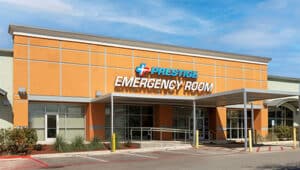When it comes to heart attacks, what you don’t know can be life-threatening, especially for women.
Recognizing female heart attack symptoms early and seeking immediate emergency room care can save lives.
At Prestige Emergency Room in San Antonio, we’re ready 24/7 to provide fast, expert care for women facing heart-related emergencies.
Understanding Heart Attacks in Women: A Different Experience
A heart attack, also known as a myocardial infarction, is a medical emergency that happens when blood flow to a part of the heart muscle is blocked. This usually occurs because of a buildup of fat, cholesterol, or other substances that form a plaque in the coronary arteries.
When a plaque ruptures, a clot can form, stopping blood flow and depriving the heart muscle of oxygen.
Without quick treatment, the affected heart tissue begins to die, leading to severe, life-threatening damage.
While this general process is the same for everyone, heart attack symptoms often present differently in women than in men.
Why Women’s Heart Attacks Often Go Undiagnosed
Women are less likely to experience the “classic” crushing chest pain many people associate with heart attacks. Instead, symptoms can appear as fatigue, nausea, back pain, or shortness of breath, leading many women to delay seeking help.
The Science Behind Gender Differences in Heart Disease
Biological differences, such as smaller coronary arteries and hormonal factors, mean that women’s heart disease often develops differently. Blockages may be more diffuse and harder to detect, increasing the risk of missed or delayed diagnosis.
Common Female Heart Attack Symptoms
While symptoms vary, these are the most frequently reported heart attack symptoms in women:
- Chest pain or discomfort (may feel more like pressure, tightness, or fullness).
- Shortness of breath with or without chest pain.
- Pain or discomfort in one or both arms.
- Weakness, fatigue, or sudden exhaustion.
- Nausea or vomiting.
It is essential to know that chest pain is still a common symptom, but women often experience it differently from men.
Unique Early Signs of Heart Attack in Women
Women often report unique early warning signs that are easy to overlook.
Recognizing these signs can make all the difference:
- Unusual or Extreme Fatigue Days or Weeks Before: Feeling unusually tired or “wiped out” with simple activities.
- Jaw, Neck, or Upper Back Pain: Discomfort in these areas instead of the chest.
- Nausea, Vomiting, and Digestive Distress: Symptoms that can mimic a stomach bug.
- Anxiety or a Feeling of Impending Doom: A sudden sense that something is very wrong.
- Breaking Out in a Cold Sweat: Sweating heavily for no apparent reason.
These pre-heart attack symptoms in females are often warning signs that something serious is developing.
Subtle Warning Signs Women Often Dismiss
Some symptoms seem minor but may signal the start of a heart attack. Be alert for:
- Dizziness or Lightheadedness: Feeling faint, especially when standing or moving.
- Heart Palpitations or Racing Heart: A fluttering or pounding sensation in your chest.
- Indigestion or Heartburn That Won’t Go Away: Persistent discomfort, even without eating spicy food.
- Persistent Cough or Flu-Like Symptoms: Weakness, body aches, or coughing that doesn’t improve.
When in doubt, trust your instincts and seek emergency care immediately.
Risk Factors: Women and Heart Attacks
Several factors raise a woman’s risk of heart attack, including:
- High blood pressure.
- High cholesterol.
- Diabetes.
- Smoking.
- A family history of heart disease.
- Obesity.
- Menopause (due to hormonal changes).
- Stress and depression.
Knowing and managing your risk factors can lower your chances of experiencing a heart attack.
When to Seek Emergency Care
Never ignore possible signs of a heart attack, even if they seem mild.
You should visit an emergency room immediately if:
- You have chest pain, pressure, or discomfort lasting more than a few minutes.
- You feel sudden weakness, shortness of breath, or dizziness.
- You experience pain in the jaw, neck, back, or arms.
- You have a gut feeling that something is very wrong (a feeling of impending doom).
Early treatment saves lives. Find your nearest Prestige ER location now.
Diagnosis and Treatment: What to Expect in the ER
When you arrive at Prestige Emergency Room with suspected heart attack symptoms, you can expect:
- A quick assessment of vital signs and symptoms.
- An electrocardiogram (EKG) to check your heart’s electrical activity.
- Blood tests to look for heart damage.
- Imaging tests, if needed, to confirm the diagnosis.
Depending on your condition, treatment may include medications, clot-busting drugs, or procedures to restore blood flow.
After a Heart Attack: Recovery for Women
Recovery from a heart attack often looks different for women. Aftercare may include:
- Cardiac rehabilitation programs.
- Lifestyle changes (i.e., healthy eating, exercise, and quitting smoking).
- Managing stress and emotional health.
- Ongoing medications to protect the heart.
Regular follow-ups with your healthcare team are essential to monitor healing and prevent future heart issues.
Heart Attack Prevention Strategies for Women
There’s a lot that women can do to protect their heart health. Some key prevention tips include:
- Eat a heart-healthy diet rich in fruits, vegetables, and lean proteins.
- Maintain a healthy weight.
- Exercise regularly (aim for at least 150 minutes of moderate activity per week).
- Manage blood pressure, cholesterol, and diabetes carefully.
- Don’t smoke and avoid secondhand smoke.
- Prioritize mental health and manage stress.
Small daily changes can significantly reduce the risk of heart disease in women.
Prestige ER’s Approach to Women’s Cardiac Emergencies
At Prestige Emergency Room, we understand that heart attack symptoms in women can look different, and we’re trained to act quickly and accurately when minutes matter.
Our emergency teams are available 24/7 across our locations to provide:
- Immediate cardiac evaluation.
- Life-saving interventions.
- Compassionate, personalized care.
If you experience symptoms of a heart attack, don’t wait. Visit Prestige ER for expert emergency care now.
In an emergency, trust Prestige ER to be your fast action and expert care partner.












